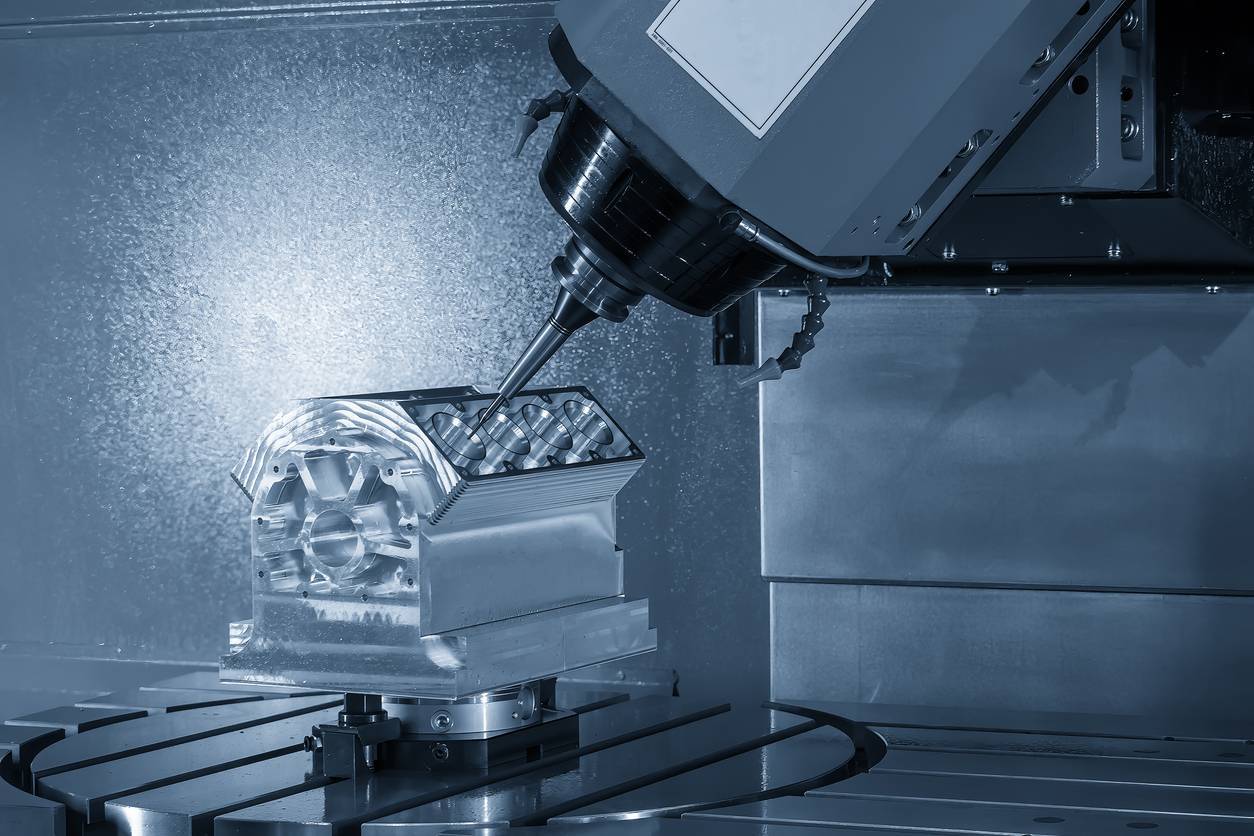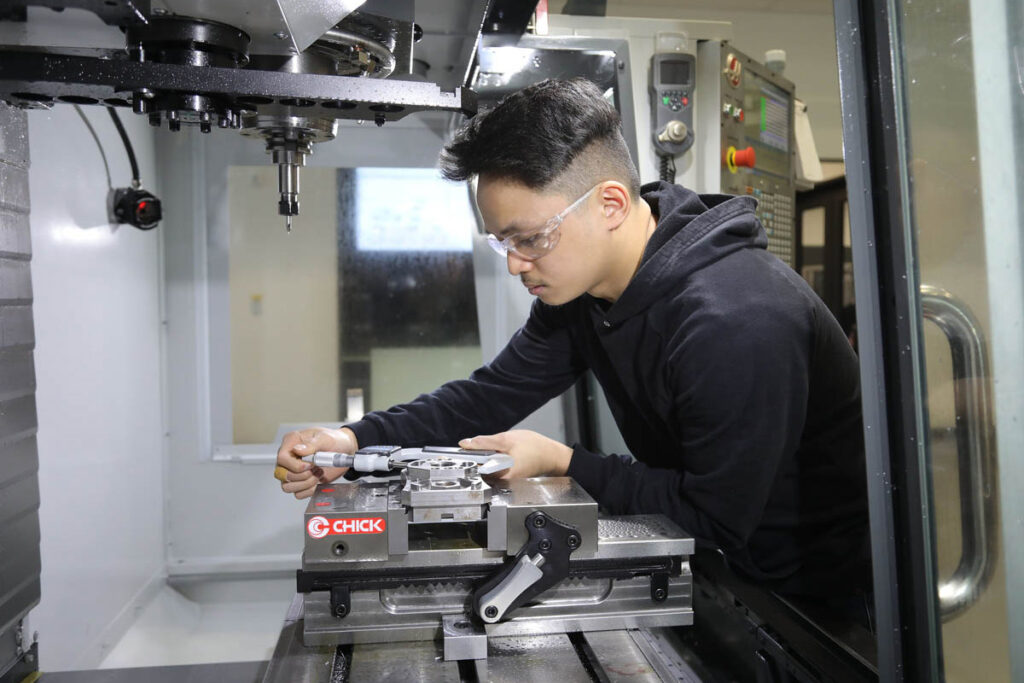Exactly How CNC Machining Providers Enhance Effectiveness in Milling and Turning Procedures
CNC machining solutions play a pivotal role in enhancing performance within milling and turning processes. By utilizing automation and exact control, these solutions decrease human mistake and guarantee consistent output. The capability to manage intricate geometries and keep limited resistances streamlines production. The complete level of CNC modern technology's impact goes beyond basic efficiency gains. There are deeper ramifications and future patterns that require further exploration.
The Basics of CNC Machining
CNC machining is an exact manufacturing procedure that uses computer-controlled makers to produce elaborate components and parts. This technology employs computer-aided design (CAD) software program to create comprehensive models, which are then translated right into equipment guidelines. The procedure typically involves various procedures such as milling, transforming, and exploration, enabling makers to attain high levels of accuracy and repeatability.
CNC equipments are outfitted with advanced tooling that can adjust products like timber, metal, and plastic. They run with a series of commands that determine motions, speeds, and device changes, decreasing human error and enhancing manufacturing efficiency.
The automation integral in CNC machining enables for limited tolerances and complicated geometries to be consistently generated, making it a preferred selection in industries calling for precision, such as aerospace and vehicle. Understanding the principles of CNC machining is vital for valuing its role in modern-day manufacturing processes.
Benefits of CNC Machining in Milling
CNC machining provides substantial advantages in milling processes, specifically concerning accuracy and accuracy. This innovation not just enhances production rate but likewise permits the creation of complicated styles that would certainly be challenging to accomplish by hand. Consequently, companies can enhance performance and expand their abilities in production.
Precision and Accuracy
Attaining unequaled accuracy and accuracy in milling processes is a characteristic of advanced machining methods. CNC machining solutions make use of computer-controlled systems that meticulously carry out layouts with very little human treatment. This automation assures that each cut and contour is done to specific specifications, substantially minimizing the threat of errors commonly related to manual milling. The ability to generate elaborate geometries with tight resistances is a key advantage, enabling makers to fulfill rigorous quality requirements. Additionally, CNC makers can maintain constant efficiency across multiple runs, guaranteeing harmony in production. This level of precision not just boosts item quality however also lowers product waste, causing a lot more effective use of resources. Generally, CNC machining services change milling procedures via their commitment to accuracy and information.
Raised Manufacturing Speed
Accelerating manufacturing rate is among the standout benefits of modern-day machining solutions. CNC machining considerably decreases the time needed for grating processes by automating procedures and lessening manual treatment. Makers can run continuously, enabling boosted output without giving up high quality. The ability to program numerous tasks right into a single setup additionally improves manufacturing, allowing manufacturers to total complex work in less time. In addition, CNC devices keep high-speed cutting capacities, resulting in quicker product removal and faster cycle times. This improved efficiency translates to much shorter preparations, allowing firms to respond promptly to market demands. Generally, increased manufacturing rate through CNC machining not just boosts efficiency but likewise boosts competitive benefit in the production industry.
Facility Design Abilities
The capacity to create elaborate layouts is a significant advantage of modern-day machining solutions. CNC machining permits the production of intricate geometries that would certainly be challenging, if not difficult, to attain using conventional approaches. This capability comes from innovative shows and automated devices that precisely follow digital plans, making certain accuracy and repeatability. Therefore, producers can create complex components with limited resistances, optimizing performance in different applications. Furthermore, the adaptability of CNC equipments makes it possible for rapid adjustments to develop specs without substantial retooling, simplifying the manufacturing process. This adaptability not only enhances creativity in layout however also enables for effective testing and advancement, offering services an affordable edge in the ever-evolving market.

Benefits of CNC Transforming Procedures
CNC transforming processes provide significant benefits in manufacturing, especially concerning accuracy and accuracy. These procedures allow for the production of extremely described elements with marginal tolerances, ensuring high quality in manufacturing. Furthermore, the efficiency of CNC turning adds to decreased preparations, enabling much faster delivery of completed items.
Precision and Accuracy
Precision and accuracy are hallmark features of CNC turning procedures, setting them apart in the manufacturing landscape. These procedures utilize computer mathematical control to guide reducing devices with unrivaled exactness. This causes components that satisfy rigorous specifications and resistances, reducing the possibility of mistakes. CNC transforming enables repeatable and regular production, making sure that each component is practically the same, which is vital in markets calling for high standards, such as aerospace and medical gadgets - jig and fixture tooling. Additionally, advanced software application and modern technology enable real-time changes throughout machining, boosting general top quality. By decreasing human error and optimizing control over the production procedure, CNC transforming solutions supply premium accuracy and precision, making them an important choice for modern manufacturing requirements
Minimized Lead Times
Minimized preparations are a significant benefit of CNC transforming procedures, originating from their capacity to automate and maximize manufacturing. CNC turning devices operate with high efficiency, allowing for fast arrangement and implementation of numerous jobs without the requirement for their explanation substantial hands-on intervention. This automation reduces downtime and speeds up the manufacturing process, enabling quicker turn-around for orders. In addition, CNC modern technology improves consistency and decreases errors, which even more contributes to faster manufacturing cycles. As an outcome, companies can meet limited due dates and respond without delay to market demands. By leveraging CNC turning procedures, business can improve operations, boost resource allocation, and inevitably improve their one-upmanship via minimized lead times.
Precision and Accuracy in Manufacturing
While making processes have actually progressed considerably for many years, the importance of accuracy and accuracy continues to be paramount. In CNC machining, these 2 elements are essential to producing top quality parts that satisfy specific specs. The assimilation of advanced computer system technology enables for thorough control over machining specifications, ensuring that parts are crafted with marginal discrepancy from desired designs.
Accuracy in making refers to the repeatability of procedures, while precision represents how carefully a completed component aligns with its designated measurements. CNC machines use innovative software program and tools that allow suppliers to achieve both, significantly minimizing the margin for mistake - fast prototyping. This ability is especially crucial in industries such as aerospace, automotive, and medical, where even minor mistakes can cause tragic failings

Decreasing Lead Times With CNC Technology
CNC technology accelerates manufacturing timelines by streamlining the machining procedure. By automating tasks, CNC machines decrease hand-operated treatment, substantially minimizing the time needed for arrangement and procedure. This effectiveness enables manufacturers to react quickly to market demands, fulfilling orders much faster than standard machining techniques allow.
In addition, CNC innovation uses rapid prototyping capacities, enabling for quick iterations and adjustments based on customer feedback. The accuracy of CNC machining guarantees that components are created correctly the very first time, lowering the probability of costly mistakes and rework.
Advanced scheduling and programs abilities enhance operations, permitting numerous procedures to browse around this site run simultaneously. This integration of technology not only shortens preparations but also enhances general efficiency. Eventually, the fostering of CNC machining services gears up makers with the devices essential to fulfill limited target dates while keeping high-quality criteria in manufacturing.
The Future of CNC Machining in Sector
As manufacturers increasingly adopt CNC modern technology to simplify procedures and minimize preparations, the future of CNC machining in sector shows up appealing. Advancements such as expert system and visit the website maker understanding are readied to reinvent the abilities of CNC devices, enhancing their precision and adaptability. These advancements will promote real-time tracking and predictive upkeep, lessening downtime and optimizing production performance.
Additionally, the integration of Net of Things (IoT) technologies will allow far better information collection and analysis, enabling producers to make informed decisions that even more boost functional effectiveness. The increase of additive production alongside CNC machining is expected to enhance traditional techniques, giving greater style adaptability and material effectiveness.
In addition, as sustainability becomes a concern, CNC machining is advancing to incorporate green practices, which will draw in eco aware consumers. In general, the future of CNC machining is defined by continual innovation and adaptation, positioning it as a foundation of modern-day production.
Regularly Asked Questions
What Materials Are Compatible With CNC Machining Solutions?
CNC machining solutions are suitable with numerous products, consisting of steels like steel, titanium, and aluminum, as well as plastics such as acrylic and polycarbonate. Wood and composites also suit CNC processes for diverse applications.
How Does CNC Machining Contrast to Traditional Machining Methods?
CNC machining supplies greater automation, consistency, and accuracy contrasted to typical techniques. It minimizes human mistake, boosts manufacturing rate, and permits for complex designs, making it an exceptional choice in modern manufacturing settings.
What Industries Advantage one of the most From CNC Machining Solutions?
The aerospace, vehicle, medical, and electronics industries profit substantially from CNC machining solutions. These markets take advantage of speed, customization, and accuracy to enhance item high quality while decreasing production costs and time, inevitably enhancing overall operational performance.
Can CNC Machines Manage Complicated Geometries and Designs?
CNC machines are experienced at taking care of intricate geometries and layouts, permitting for accuracy and complex describing. Their innovative programs capabilities enable makers to produce parts with high precision, meeting varied sector demands and enhancing item performance.
What Is the Typical Expense Range for CNC Machining Providers?
The typical expense range for CNC machining solutions differs widely, usually falling in between $50 to $150 per hour, depending upon variables such as material, intricacy, volume, and the specific machining processes used.
CNC machining is an accurate production process that makes use of computer-controlled devices to generate elaborate components and components. CNC machining supplies considerable advantages in milling procedures, specifically concerning accuracy and precision. CNC machining substantially decreases the time required for grating procedures by automating procedures and decreasing manual intervention. CNC innovation speeds up manufacturing timelines by simplifying the machining procedure. As manufacturers increasingly adopt CNC innovation to improve processes and minimize lead times, the future of CNC machining in industry shows up encouraging.